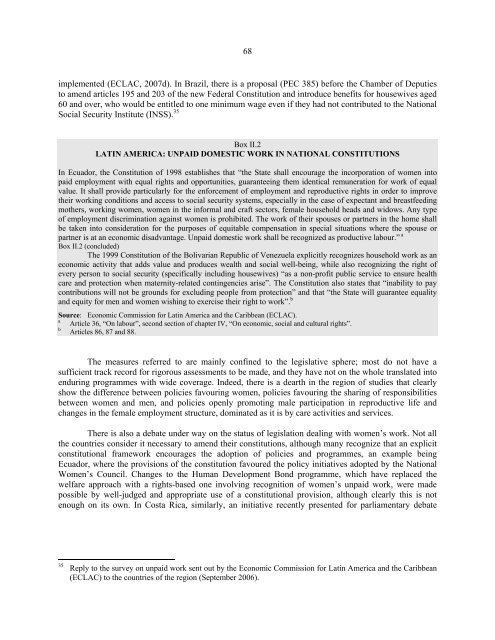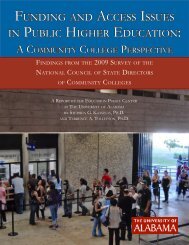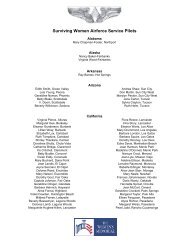Women in Latin America and the Caribbean - Cepal
Women in Latin America and the Caribbean - Cepal
Women in Latin America and the Caribbean - Cepal
You also want an ePaper? Increase the reach of your titles
YUMPU automatically turns print PDFs into web optimized ePapers that Google loves.
68<br />
implemented (ECLAC, 2007d). In Brazil, <strong>the</strong>re is a proposal (PEC 385) before <strong>the</strong> Chamber of Deputies<br />
to amend articles 195 <strong>and</strong> 203 of <strong>the</strong> new Federal Constitution <strong>and</strong> <strong>in</strong>troduce benefits for housewives aged<br />
60 <strong>and</strong> over, who would be entitled to one m<strong>in</strong>imum wage even if <strong>the</strong>y had not contributed to <strong>the</strong> National<br />
Social Security Institute (INSS). 35<br />
Box II.2<br />
LATIN AMERICA: UNPAID DOMESTIC WORK IN NATIONAL CONSTITUTIONS<br />
In Ecuador, <strong>the</strong> Constitution of 1998 establishes that “<strong>the</strong> State shall encourage <strong>the</strong> <strong>in</strong>corporation of women <strong>in</strong>to<br />
paid employment with equal rights <strong>and</strong> opportunities, guarantee<strong>in</strong>g <strong>the</strong>m identical remuneration for work of equal<br />
value. It shall provide particularly for <strong>the</strong> enforcement of employment <strong>and</strong> reproductive rights <strong>in</strong> order to improve<br />
<strong>the</strong>ir work<strong>in</strong>g conditions <strong>and</strong> access to social security systems, especially <strong>in</strong> <strong>the</strong> case of expectant <strong>and</strong> breastfeed<strong>in</strong>g<br />
mo<strong>the</strong>rs, work<strong>in</strong>g women, women <strong>in</strong> <strong>the</strong> <strong>in</strong>formal <strong>and</strong> craft sectors, female household heads <strong>and</strong> widows. Any type<br />
of employment discrim<strong>in</strong>ation aga<strong>in</strong>st women is prohibited. The work of <strong>the</strong>ir spouses or partners <strong>in</strong> <strong>the</strong> home shall<br />
be taken <strong>in</strong>to consideration for <strong>the</strong> purposes of equitable compensation <strong>in</strong> special situations where <strong>the</strong> spouse or<br />
partner is at an economic disadvantage. Unpaid domestic work shall be recognized as productive labour.” a<br />
Box II.2 (concluded)<br />
The 1999 Constitution of <strong>the</strong> Bolivarian Republic of Venezuela explicitly recognizes household work as an<br />
economic activity that adds value <strong>and</strong> produces wealth <strong>and</strong> social well-be<strong>in</strong>g, while also recogniz<strong>in</strong>g <strong>the</strong> right of<br />
every person to social security (specifically <strong>in</strong>clud<strong>in</strong>g housewives) “as a non-profit public service to ensure health<br />
care <strong>and</strong> protection when maternity-related cont<strong>in</strong>gencies arise”. The Constitution also states that “<strong>in</strong>ability to pay<br />
contributions will not be grounds for exclud<strong>in</strong>g people from protection” <strong>and</strong> that “<strong>the</strong> State will guarantee equality<br />
<strong>and</strong> equity for men <strong>and</strong> women wish<strong>in</strong>g to exercise <strong>the</strong>ir right to work”. b<br />
Source: Economic Commission for Lat<strong>in</strong> <strong>America</strong> <strong>and</strong> <strong>the</strong> <strong>Caribbean</strong> (ECLAC).<br />
a<br />
Article 36, “On labour”, second section of chapter IV, “On economic, social <strong>and</strong> cultural rights”.<br />
b<br />
Articles 86, 87 <strong>and</strong> 88.<br />
The measures referred to are ma<strong>in</strong>ly conf<strong>in</strong>ed to <strong>the</strong> legislative sphere; most do not have a<br />
sufficient track record for rigorous assessments to be made, <strong>and</strong> <strong>the</strong>y have not on <strong>the</strong> whole translated <strong>in</strong>to<br />
endur<strong>in</strong>g programmes with wide coverage. Indeed, <strong>the</strong>re is a dearth <strong>in</strong> <strong>the</strong> region of studies that clearly<br />
show <strong>the</strong> difference between policies favour<strong>in</strong>g women, policies favour<strong>in</strong>g <strong>the</strong> shar<strong>in</strong>g of responsibilities<br />
between women <strong>and</strong> men, <strong>and</strong> policies openly promot<strong>in</strong>g male participation <strong>in</strong> reproductive life <strong>and</strong><br />
changes <strong>in</strong> <strong>the</strong> female employment structure, dom<strong>in</strong>ated as it is by care activities <strong>and</strong> services.<br />
There is also a debate under way on <strong>the</strong> status of legislation deal<strong>in</strong>g with women’s work. Not all<br />
<strong>the</strong> countries consider it necessary to amend <strong>the</strong>ir constitutions, although many recognize that an explicit<br />
constitutional framework encourages <strong>the</strong> adoption of policies <strong>and</strong> programmes, an example be<strong>in</strong>g<br />
Ecuador, where <strong>the</strong> provisions of <strong>the</strong> constitution favoured <strong>the</strong> policy <strong>in</strong>itiatives adopted by <strong>the</strong> National<br />
<strong>Women</strong>’s Council. Changes to <strong>the</strong> Human Development Bond programme, which have replaced <strong>the</strong><br />
welfare approach with a rights-based one <strong>in</strong>volv<strong>in</strong>g recognition of women’s unpaid work, were made<br />
possible by well-judged <strong>and</strong> appropriate use of a constitutional provision, although clearly this is not<br />
enough on its own. In Costa Rica, similarly, an <strong>in</strong>itiative recently presented for parliamentary debate<br />
35<br />
Reply to <strong>the</strong> survey on unpaid work sent out by <strong>the</strong> Economic Commission for Lat<strong>in</strong> <strong>America</strong> <strong>and</strong> <strong>the</strong> <strong>Caribbean</strong><br />
(ECLAC) to <strong>the</strong> countries of <strong>the</strong> region (September 2006).











